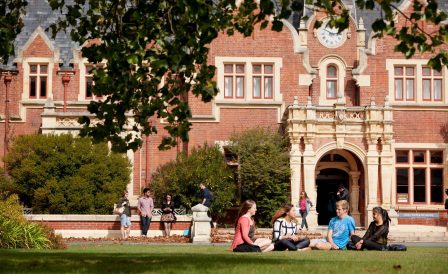New Zealand is considered one of the countries with the most complex visa processes. Obtaining non-tourist visas (such as student visas) is equally challenging for countries like Canada, Australia, and several others. Preparing a document package for a student visa usually raises many questions for the applicant.
To increase your chances of obtaining a visa, it’s important to consider numerous details and nuances. At this stage, it is highly recommended to seek help from a student agent or an immigration adviser. These specialists are well-acquainted with the requirements of visa officers and have extensive experience in successfully preparing visa cases. Thorough preparation for moving to New Zealand can take anywhere from a couple of months to several years.
To make the visa application process easier for you, we recommend reading this article.
Content:
- Types of student visas
- How to increase your chances of getting a visa
- 5 important questions you must answer to immigration officer
- Important factors when applying for student visas

Types of student visas
For studying in New Zealand you need to get appropriate visa. There are two main types of student visas:
- Student Visa (Open student visa)
- Limited Purpose Visa
The difference between them is that you cannot change or extend Limited Purpose Visa being in New Zealand. And it will be cancelled once you leave the country. Also, sometimes Limited Purpose Visa doesn’t allow to work part-time during your studying period.
As we mentioned before, if you get Limited Visa, don’t be upset. For example, it may be a good reason to visit Fiji and apply for a new visa from there.
The type of visa you will receive depends on your personal background and the Immigration Officer reviewing your application. According to official guidelines, a Student Visa serves strictly for the purpose of study, not for job searching or immigration. Therefore, it is important to convince the officer that your primary intention is to study, and that you are prepared to return home after completing your education.

How to increase chances of getting student visas
The visa officer evaluates the applicant based on a number of criteria. And ties to the home country are among the most important. These “anchors” are reasons that motivate a person to leave New Zealand after completing their studies. Officers are not inclined to approve applications with clear immigration intentions. So, this significantly reduces the chances of receiving a visa.
The general rule is: the applicant’s case should create the impression of a transparent and lawful lifestyle. The applicant is in demand at home, doing well professionally or personally. And they plan to stay in New Zealand temporary.
You need to present information about what ties you to your home country. For example:
-
Family (husband, wife, children, parents)
This is where the problem lies for those who want to travel with the whole family for language courses. At Kiwi Education, we do not recommend this approach. Because the visa officer may consider it as an attempt to immigrate. It is better for one family member to go first. The rest of the family can apply later depending on the circumstances. Eventually, it is possible to bring the family over, but there will be different options depending on the situation.
For students enrolled in professional courses, the situation is a bit easier. However each case still needs to be evaluated individually.
-
Current job (high position, salary, recommendation letters)
At Kiwi Education, we do not recommend quitting your job before submitting your application for a New Zealand Student Visa. However, even if you have already left your job, it would be a good idea to obtain a reference letter from your employer stating that you were a valuable employee and that they would be happy to have you back should you choose to return.
-
Current study
If you are currently pursuing an education and have simply taken an academic leave of absence, this can also be considered a valid reason to return home, which will be viewed positively by the visa officer.
-
Property ownership (real estate, vehicle)
Owning any property also indicates that you are not “burning bridges”. So, you have reasons to return home, where all of this is waiting for you.
-
Business
If you have your business, it will be helpful to inform the visa officer about it. Because it’s also a sort of “anchor”.

Documents which may persuade the officer to make a right decision
- Previous interest in learning the language (if go for language courses) or in professional field (if go for a college / university, especially for master’s programs). This is a common question from visa officers when refusing a Student Visa: “Why haven’t you shown interest in the sphere before?” By providing course completion certificates or other proofs, you address this concern. Moreover, if you present an IELTS certificate with a score of 5.0 or higher as proof of your language interest (for language courses), you may also become eligible to work up to 20 hours per week during your studies and 40 hours per week during holidays.
- Positive travel history. Visas in your passport also reflect well on you. Especially if you have no previous visa refusals or violations of visa conditions.
- Cover letter. A well-written, clear letter that fully explains your motivation can also positively influence the visa officer. For example, you may state that you need the tuition to advance in your current career or to start a new one. Alternatively, if you apply for language courses, you might explain that you plan to pursue further specialized education in New Zealand once your language level is sufficient.
5 important questions you must answer to the visa officer
- Why exactly New Zealand;
- Why you’ve chosen this particular program, how will it help you in future;
- What are your future plans in general (remember, the purpose of student visa is studying only);
- Your biography, especially working experience with documented proofs;
- Your “anchors” outside New Zealand.
General logic of the whole case
A logical overall pathway significantly increases your chances of obtaining a visa. That’s why those who plan to switch career fields need to be especially careful when preparing their visa application. In cases of a drastic career change (for example, from management to IT), you will need to clearly explain your motivation to both the educational institution and the immigration officer. Because this raises the risk of a visa refusal. Additionally, most diploma programs at Level 7 and above expect students to have prior experience or education in their chosen field of study.
When changing your career field, the main task will be to provide documented evidence that such a change is necessary for your professional development. Any proof of prior interest in the chosen field can help. For instance, volunteering, internships, or short-term training. Also, you need to explain clearly how the planned education will support your career growth and advancement. The closer your chosen specialization is to your previous experience, the easier it will be to obtain a student visa. We recommend not focusing solely on how in-demand the profession is, but rather building on your existing work experience, skills, and education.
If a person decides to study in a field different from their previous work experience or education, it is important to spend at least six months to a year gaining the necessary knowledge and skills in the new area.

Important factors when applying for student visas
When preparing documents for a Student Visa for language courses or diploma programs important factors are:
- Documented proofs of working experience;
- Maximum financial transparency;
- Documentary proof of the legality of income used for education;
- Confirmation of educational background;
- Availability of documents proving professional growth;
- Evidence that the applicant has obligations in their home country to which they will return after completing their studies;
- A clear explanation of why the applicant needs overseas education and how it will benefit their career;
- A travel history in the passport.
The more of these factors you can provide, the higher your chances of getting a visa. The fewer — the lower the chances, respectively. Even for a visitor visa, it’s important for a tourist to submit a complete set of documents.
This article lists only some of the many important details to consider when preparing a visa application. Our goal is to inform clients in advance about possible difficulties and help them prepare. Every case is unique, and the support of a student agent or licensed advisor can help highlight the strengths of your individual case.

We hope this information will be useful to you when applying for a Student Visa to New Zealand.
Also, you can get detailed information about which documents you need to collect and how to submit them from the staff at Kiwi Education, as well as on the official immigration website of INZ (Immigration New Zealand).




